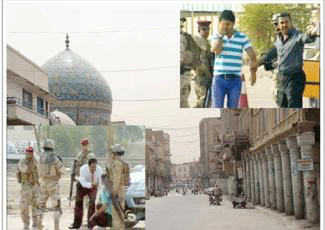
Scene from the show
Laugh! There is a Bomb in your Car
by Sinan Antoon, al-Jadaliyya.com, September 11, 2010
Ramadan is a very special time of year for Muslims and it is impossible to overestimate its socio-cultural importance. Additional time and effort are invested in its daily rituals and practices. Familial and social bonds are augmented and celebrated. Traditional games used to be an important facet of the month’s celebratory and festive mood culminating in the feast marking the month’s end. While these games are still popular and are still played in many parts of the Islamicate world, they have been largely eclipsed by visual entertainment. Thus, Ramadan is the month to watch TV and follow the new shows and soap operas. It is the month with the highest rates of viewership as families and friends gather around TVs. Stations and satellite channels invest heavily in their Ramadan productions. It is also the perfect time of year to take the political and cultural pulse. For Iraqis, Ramadan has been more of a challenge this year than it usually is. The country is still without a government after more than five months of fruitless negotiations. Despite claims to the contrary, the government has failed miserably in providing security for its citizens as suicide attacks continue.
The long hours without electricity everyday made fasting and going about one’s daily life hellish. But even when there is electric power, the horror of daily life with its bombings and explosions crawls into the screen every night. While it is always necessary and important for citizens to be informed of events in their country, they should also get a respite from this horror and escape it even for a few hours.
The al-Baghdadiyya satellite channel came up with the brilliant idea that the daily horror of explosions and car bombs witnessed by average citizens would be great material for its candid-camera style show Khalli Nbuga (Let’s Steal It). Last year’s show featured various singers, actors, and artists being invited for a mock-interview at the studio during which the show’s sleazy presenter quizzed them in a very aggressive and insulting manner, causing most guests to storm out or even get into fights before being told that they were on a candid-camera style show. This year, the show invited a journalist or an artist into an interview with al-Baghdadiyya. With the help of an entire unit from the Iraqi army who acted along, the target’s car was stopped and searched at a checkpoint. The victim was then told by the soldiers that his or her car had explosives and they were instantly accused of trying to blow up al-Baghdadiyya. They were told that they would be arrested for engaging in terrorism. Needless to say, most of the victims of this prank show didn’t respond so well to the thought of being guests to Iraq’s new prison system. Some lost consciousness or had a sudden increase in their blood pressure. Others had to be taken to the hospital since they already suffered from various ailments caused by living the happy life in a free Iraq. The horror and trauma inflicted on the show’s “guests†compelled many to write articles in the Iraqi media calling on al-Baghdadiyya to stop the show. Petitions calling on the satellite channel to stop broadcasting it were circulated. The Iraq Media and Communication Commission (a child of Bremmer’s era) sent a warning to al-Baghdadiyya to the same effect, but the latter responded by interviewing a few viewers who expressed their support.
Al-Baghdadiyya is an example of the chaotic world of post-invasion Iraqi media. It was established in 2005 by an Iraqi businessman who is said to have made his fortune by exporting cigarettes to Iraq in the 1990’s. Al-Baghdadiyya’s main office is in Cairo and many of its employees have significant Ba`thist credentials.
Even if Iraqi citizens had any recognizable and guaranteed rights and even if they had a functioning legal system they could navigate, this show would still not be funny. What is tragicomic, of course, is that an entire unit of the Iraqi army was assigned to act along in this silly show at a time when the “enemies of freedom and democracy†were carrying out attacks in Baghdad and elsewhere and killing scores of innocent Iraqis.
What the show reveals unwittingly is the extent to which violence and horror have become the primary thread in the fabric of daily life in Iraq so that they could be considered comic material. The resources allocated for the protection of Iraqi civilians are used instead to humiliate them and trivialize the horrors they have to live with and endure every day.